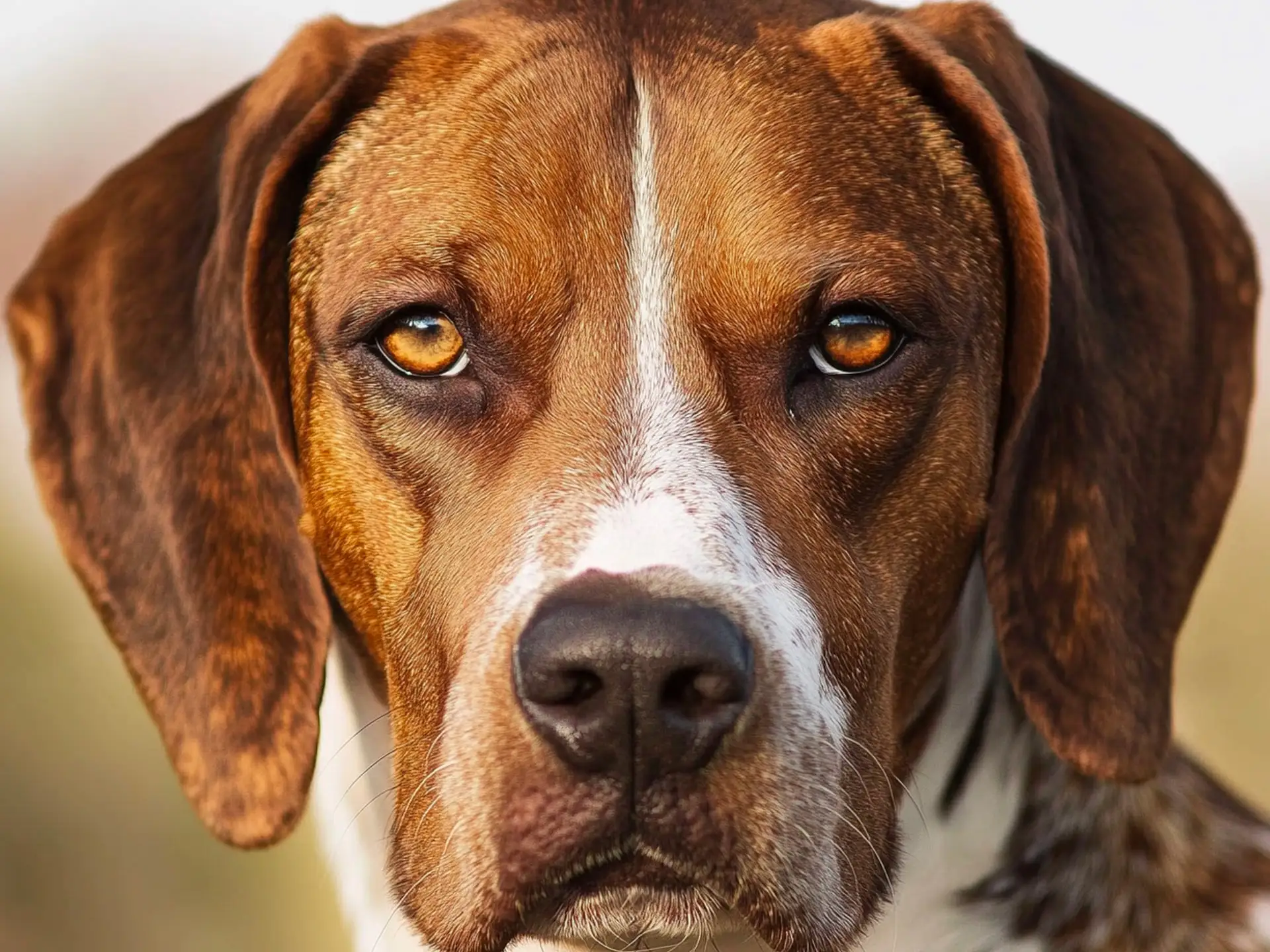Portuguese Pointer Dog Breed Info & Overview
The Portuguese Pointer is a skilled hunting dog with a deep-rooted history in Portugal. Bred for tracking and retrieving game, this athletic and intelligent breed thrives on physical activity and human companionship. With a loyal and affectionate nature, the Portuguese Pointer makes an excellent working partner and a devoted family pet, excelling in active households that can match its energy and enthusiasm.
Characteristics
Pictures
Breed History
The Portuguese Pointer traces its roots back to the royal kennels of Portugal, where it was prized for its unmatched ability to flush and point game birds. Over time, it evolved into a well-loved hunting dog, renowned for its loyalty and eagerness to please. Influences from local hounds helped shape its robust nature and quick reflexes.
Early on, wealthy Portuguese aristocrats popularized the breed, valuing these agile canines for their sharp instinct and boundless enthusiasm in the field. The breed’s strong athleticism stemmed from careful breeding practices, which ensured sound physical traits and a steadfast hunting drive. Despite its specialized history, this dog naturally adapted to family life.
During periods of decreased hunting, rural communities kept the Portuguese Pointer’s lineage alive. Though less common than other hunting breeds, it remains a cherished national treasure in its homeland. Modern fanciers aim to preserve its heritage while showcasing the dog’s versatile role as both a diligent sporting partner and a loving companion.
Temperament, Personality
Portuguese Pointers are known for their warm, affectionate nature, making them perfect for families who enjoy an active outdoor lifestyle. With boundless enthusiasm, they greet loved ones excitedly, always eager for the next adventure. Their gentle side shines when they’re resting at home, often seeking belly rubs and close contact with their favorite humans.
When socialized correctly, these dogs usually get along well with children and other pets. Their even temper helps them adapt to new situations, although a watchful introduction is wise when bringing them into a home with smaller animals. They excel in households that can offer plenty of structured playtime.
Strangers will be met with initial caution, but a Portuguese Pointer rarely shows aggression if it has been properly socialized. A few friendly greetings and maybe a treat or two often transform newcomers into new playmates. Consistent social exposure helps them become well-rounded companions that blend easily into family life.
Physical Characteristics
A Portuguese Pointer boasts a lean, muscular frame with a balanced stance that suggests both endurance and agility. The head is broad, featuring expressive eyes that convey eagerness and warmth. Its sleek, short coat usually comes in shades of liver, orange, or yellow, with or without white markings on the chest and feet.
Large, pendant ears hang close to the cheeks, capturing every rustle in the brush. This breed’s tail is medium-length, carried level to the back when on point in the field. The dog’s athletic physique was shaped by centuries of selective breeding, emphasizing speed, power, and resilience.
Beyond hunting, these good looks are a bonus for families who prefer a dog with minimal grooming needs. While not as heavy as some larger gundogs, the Portuguese Pointer’s size places it firmly in the medium-to-large category. Its flexible build allows it to thrive in various outdoor pursuits and sporting events.
Health Issues
Like many active breeds, Portuguese Pointers can sometimes experience joint-related concerns such as hip and elbow dysplasia. Regular veterinary check-ups and maintaining a healthy weight are crucial for preventing strain on their joints. Some individuals may also be prone to ear infections, especially if their floppy ears retain moisture.
Inherited eye conditions, though not overly common, can occasionally surface. Reputable breeders conduct health screenings to catch and address these issues early on. Engaging in annual check-ups helps detect problems like progressive retinal atrophy before they advance too far.
Ensure a proper balance of exercise and rest to keep your Portuguese Pointer fit throughout its life. Overexertion when young may contribute to skeletal problems later. By focusing on preventative care and working with knowledgeable veterinarians, owners can keep these lively dogs healthy and happy for many years.
Grooming Needs
The Portuguese Pointer’s short, dense coat requires a quick brush-down once or twice a week. A simple rubber curry brush or a soft bristle brush removes loose hair and helps distribute the natural oils that keep the coat shiny. Occasional baths using a mild dog shampoo suffice, especially if your dog indulges in muddy adventures.
Pay attention to their ears, which can be prone to infections if not cleaned regularly. Gently wipe the inside of the ears with a vet-approved solution to remove any accumulated wax or debris. Trimming their nails every couple of weeks prevents overgrowth and keeps paws comfortable.
Lastly, routine dental hygiene is important. This breed might not be overly prone to dental issues, but brushing their teeth regularly and providing dental chews can stave off plaque buildup. Overall, a Portuguese Pointer’s grooming demands are fairly manageable, which suits busy but attentive owners.
Exercise Requirements
High energy defines the Portuguese Pointer, so daily walks alone won’t cut it. Aim for 1–2 hours of vigorous exercise, including brisk hikes, runs, or games of fetch in open fields. Incorporating mentally stimulating activities—like hide-and-seek with treats—keeps them engaged and happy.
Because of their hunting heritage, these dogs love to explore. Off-leash runs in secure areas are ideal, but always keep an eye on their strong prey drive. If you’re into canine sports, consider agility training or dock diving—both excellent outlets for this breed’s spirited nature.
Without sufficient exercise, a Portuguese Pointer may become restless or bored, leading to unwanted behaviors such as chewing or excessive barking. A structured exercise routine that blends both physical and mental challenges ensures a well-adjusted, contented companion ready to lounge peacefully when the day’s excitement ends.
Training Tips
Portuguese Pointers excel in positive reinforcement training, thanks to their desire to please. Avoid harsh tactics—gentle, reward-based methods encourage them to stay engaged and enthusiastic. Consistent rules and daily short sessions build a solid foundation, allowing your dog to understand what’s expected without feeling overwhelmed.
Early socialization is key, exposing the dog to new sights, sounds, and scents during puppyhood. Activities like puppy classes or friendly gatherings help them develop confidence. With time, these experiences reduce nervousness in unfamiliar situations and foster a balanced demeanor.
Obedience training benefits from the breed’s natural focus on humans, yet remember that a pointer’s hunting instincts can make recall challenging in high-distraction environments. Introduce reliable commands like “come” and “leave it” early on. Keep sessions light, fun, and varied to capture a Portuguese Pointer’s sharp mind and unwavering attention.
Nutrition, Diet
Portuguese Pointers benefit from a high-protein, moderate-fat diet crafted for energetic sporting dogs. They thrive on about 2.5 to 3 cups of quality kibble daily, divided into two meals to support stable energy levels. Look for formulas containing real meat sources like chicken or turkey as the primary ingredient.
Because this breed is active, it can burn calories quickly, but overfeeding can lead to weight gain if exercise lapses. Adjust portions based on activity level and monitor your dog’s body condition to avoid both obesity and malnutrition. Including fish oil or joint-support supplements may help keep their joints healthy.
Fresh produce like carrots or green beans can serve as low-calorie treats, providing vitamins and fiber. Always consult a veterinarian or canine nutrition expert for personalized dietary advice, particularly if your Portuguese Pointer engages in intense hunting or athletic competitions where caloric demands can spike.
Adoption, Breeders
Finding a Portuguese Pointer requires patience, as they are relatively rare outside Portugal. If you’re considering adoption, check with Portuguese Pointer Club of America and breed-specific sporting dog rescues. Occasionally, owners seek to rehome their dogs due to lifestyle changes. Engaging with the Portuguese Pointer Club Facebook group can provide leads on available dogs and firsthand owner experiences.
For those set on purchasing a puppy, prioritize ethical breeders who focus on health, temperament, and working ability. Responsible breeders conduct hip, elbow, and eye screenings to prevent hereditary issues. They should provide pedigree records, discuss lineage traits, and allow visits to meet the puppy’s parents. A well-socialized puppy raised in a nurturing environment adapts more easily and thrives as an active companion.
Whether adopting or buying, doing thorough research ensures you find the right match. Portuguese Pointers need structured environments, regular training, and ample exercise. Connecting with knowledgeable owners and breed clubs helps assess whether this energetic, hunting-driven breed aligns with your lifestyle. Taking time to choose a reputable source results in a healthier, well-adjusted dog that will be a loyal companion for years to come.
Family Pet?
This breed often shines in family environments, provided everyone is up for an active companion. The dogs are patient with children, enjoying play sessions that give them room to run and explore. Supervision is still recommended, especially with younger kids unfamiliar with proper canine interactions.
Portuguese Pointers typically adapt to multi-pet households if introduced carefully, though smaller pets might trigger their prey drive. Structured introductions and consistent training can foster harmony between the new pup and resident animals. Over time, a Portuguese Pointer becomes just another member of the family pack.
Engagement is key—these dogs crave attention, movement, and participation in family activities. By encouraging interactive games and outdoor fun, you’ll cultivate a strong bond. Families who love the outdoors will find that this breed is a loyal, energetic partner, ready to join any wholesome adventure.
Right For You?
Active individuals or households seeking a spirited companion should consider this breed. Providing daily physical and mental stimulation is vital to prevent restlessness. If you’re a hunter or an outdoors enthusiast, you’ll appreciate this dog’s robust stamina and sharp instincts.
If you live in a small apartment with limited access to outdoor spaces, the Portuguese Pointer might not be an ideal match. Adequate room to roam is important, and a fenced yard allows them to explore safely. Commitment to training, socialization, and grooming ensures your dog remains well-adjusted.
Ultimately, matching their energy level is critical. If you can offer plenty of exercise, mental engagement, and affectionate companionship, you’ll find that a Portuguese Pointer quickly becomes a cherished family member. Consider your lifestyle and time availability before making the commitment.
Conclusion
A Portuguese Pointer combines a passionate hunting spirit with a warm family-focused temperament. Whether you’re an avid outdoor adventurer or just someone who appreciates an active, devoted canine, this breed can be a joyful companion. With proper training, exercise, and a loving home, the Portuguese Pointer offers abundant loyalty and affection, making every day more exciting.
FAQs
-
How does the Portuguese Pointer differ from other pointing breeds?
Unlike the English Pointer, the Portuguese Pointer has a more compact, muscular build and is bred for closer-range hunting. It excels in dense brush environments, working intuitively with hunters rather than ranging far ahead, making it ideal for small-game bird hunting.
-
What type of prey is the Portuguese Pointer best suited for?
The Portuguese Pointer specializes in upland bird hunting, particularly quail and partridge. It uses a methodical approach, holding its steady, classic pointing stance until the hunter arrives. Its keen nose and ability to work in hot, dry conditions make it a favorite in Portugal’s rugged landscapes.
-
Can the Portuguese Pointer be used for hunting in colder climates?
While adaptable, the Portuguese Pointer is better suited for warm climates. Originating in Portugal, its short, thin coat does not provide much insulation against extreme cold. In colder regions, protective gear like jackets and limited outdoor exposure in winter are necessary.
-
What are some unique training challenges with the Portuguese Pointer?
This breed is highly intelligent but sensitive, meaning harsh training methods do not work well. The Portuguese Pointer responds best to positive reinforcement and consistency. It is a natural hunter, so training should incorporate fieldwork and scent-tracking exercises to keep it engaged.
-
What is the traditional role of the Portuguese Pointer in Portuguese culture?
Historically, the Portuguese nobility bred and used this dog for falconry and bird hunting. It remains one of Portugal’s national hunting breeds, prized for its loyalty, stamina, and hunting precision, and is still used today by hunters in rural Portuguese villages.
Breed Ratings
The Portuguese Pointer is quick-witted and eager to learn, excelling when training is consistent and positive.
With an upbeat spirit, this breed rarely turns down a chance to play or join a fun family adventure.
Brimming with stamina, they require daily exercise and thrive in active homes that can keep pace.
While not excessive, regular brushing helps manage moderate shedding from their short coat.
Bred for hunting, they have a strong instinct to chase, so secure areas and training are vital.
Their short, dense coat only needs light maintenance, making grooming simpler than many other breeds.
Eager to please and bright, but can be distracted by enticing scents, requiring patient reinforcement.
Strong family bonds can lead to anxiety if left alone for long periods.
Generally moderate, though some may be vocal when excited or under-stimulated.
Not a heavy drooler, but some slobber may appear after exercise or meals.
With proper socialization, they typically play nicely with other dogs and enjoy group activities.
Generally robust with a few known genetic issues; regular vet care supports long-term wellness.















